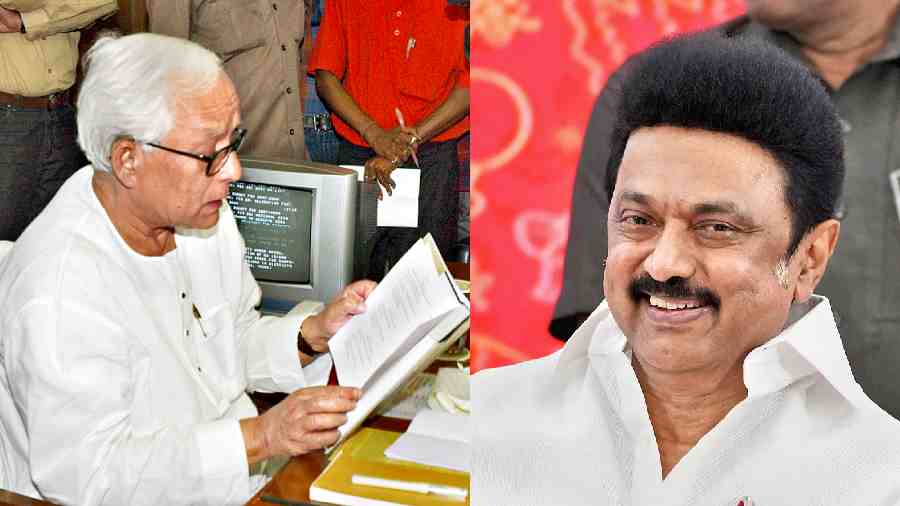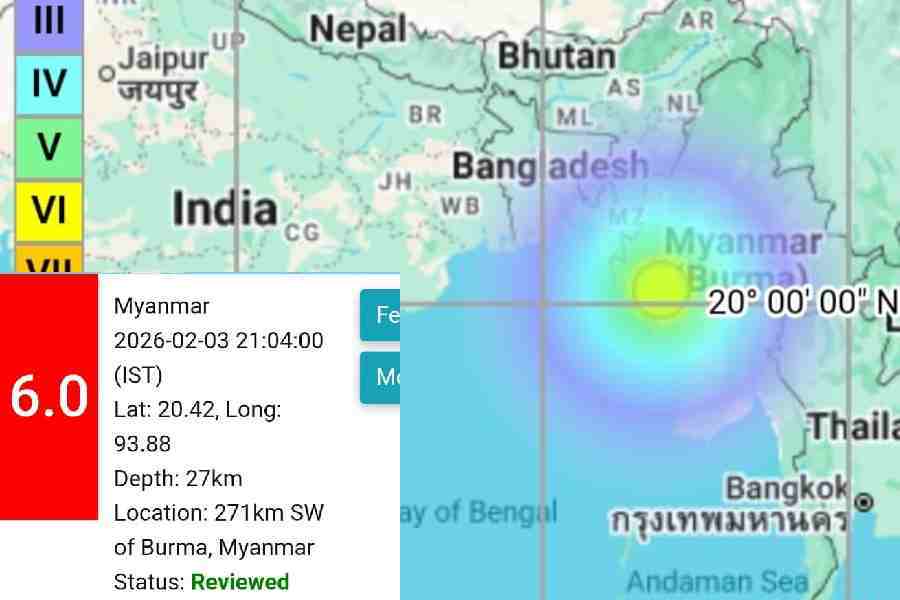Coincidences can be overdone, even by those like I, who are fascinated by them.
March 1, three days from now, is the birthday of a former chief minister and an incumbent one, both of whom I have been privileged to know: Buddhadeb Bhattacharjee, the chief minister of West Bengal from 2000 to 2011, born on March 1, 1944, and Mu Ka Stalin, the current chief minister of Tamil Nadu, born on March 1, 1953. The first turns 79 on March 1, and the second, 70. True to his temperament, if I am not mistaken, Budhhadebbabu will observe the day by not observing it. He will spend it with family and perhaps a few chosen friends in the unfussy atmosphere of his very private home. True to Tamil Nadu’s panache, Stalin will find himself at the centre of a public event — a 70th birthday does not come often — with a galaxy of political eminences from across the country offering him greetings. I hope those not in their political circles will also felicitate them. In fact, I am sure, they will. Personal courtesies are respected in our public life, in public view, of course. Just as open discourtesies are often made up for in private apologies, with no one ‘in the open’ watching. Without doubt, that juxtaposition is part of public life’s curious ways. Time was when affection was affection, both in the public and the private domains, criticism was criticism both in the public and the private domains — not one thing for the stage and another for the wings.
This column, I must say right at the outset, celebrates the two birthday-ers and will do so by sharing what would rightly be termed as ‘personal recountings’. But before the personal vignettes, some commonalities between them.
Both are adherents of ideologies — the senior of Marxism and the junior of Dravidam, or the Dravidian movement for self-respect.
Both have been groomed for the office of chief minister, the senior by the late Jyoti Basu, his leader in the Communist Party of India (Marxist) and predecessor in that office, the junior by the late Mu Karunanidhi (who gives Stalin his initials, Mu Ka), his father and leader of the Dravida Munnetra Kazhagam and predecessor both in the position of president of the DMK and the office of chief minister.
Both have had fan-scale cadres backing them in politics in and out of office.
Both have had strident opponents attacking them from the Opposition and the Treasury Benches.
Both have charisma, a calm, ‘no worries’ deportment, the ability to take bouquets and brickbats with a degree of detachment.
Both are masters of their mother tongues — Bangla and Tamil — but both speak frugally, write with economy.
Both are essentially urbane — bhadra in the case of the senior and nagarikam in the junior.
Both have occasioned, at the nation’s Centre, admiration as well as a measure of discomfort for their sangfroid, but even more for their supreme confidence in the rightness of our Constitution’s federal soul.
And they have differences, of course, which may be briefly listed as follows.
Buddhadebbabu’s cultural lineage is distinct from his political lineage — Tagore inspires him in a sphere distinct from that of Marx. He can retreat from one into the other in a way in which one may not spot the other. Where is he more at home? Only he knows. Or, to adapt the Rig Veda’s Nasadiya Sukta, perhaps even he does not know.
Stalin’s cultural and political lineages are fluxed — Thiruvalluvar and Periyar are the joint, back-to-back icons on his Dravida pantheon, with the great C.N. Annadurai and Mu Karunanidhi embossed on its plinth. His is a unified thought-abode. No chance of his getting lost in it.
Now, for the recountings. I shall keep them brief, so as not to magnify my own self.
Soon after I joined my duties in Calcutta (December, 2004), I asked Buddhababu how I could show Part One of the Ray trilogy to members of my family who were visiting. He arranged within hours a screening of Pather Panchali for us at Nandan, which was his second office after ‘Writers’. No big deal in that, one might say and that would be right. But he did not stop with that. As we came out, our hearts full with Bibhutibhushan’s story, Ray’s genius, his actors’ art, Ravi Shankar’s music, there he was, the chief minister himself, to see us off. He came up to our cars, stood there, with a wisp of an enigmatic smile, till we had driven off. ‘I know the effect the film has had on you; I know,’ he seemed to say wordlessly. That was not a chief minister doing right by a governor. That was a literary soul, an artist no less, rounding off a gesture made in and for art.
Sometime later, he said to me, “Bengali cinema is not what it was. Don’t go to see any Bengali film off hand. Please ask me about them. I will tell you what to avoid.” So as not to give readers the impression that we spoke only about cinema, let me share another experience. If Bengali cinema was not what it was, Bengal’s politics, like that of the rest of India’s, was not either. And media speculation on Governor-CM relations was high. Once when, after a meeting with me, Buddhababu was asked what we had talked about, he said, “Books. We exchange books.” This was a smart answer but it was also true. Whatever else, howsoever difficult, that we may have discussed, we also found time for books. Around 2007, a book was brought to my notice by the scholar-academic, André Beteille — Orlando Figes’ The Whisperers, on life under Stalinism in Stalinist Russia. I asked Buddhababu if he would like to read it. He showed little interest in it.
To move from that Stalin to ‘our’ Stalin (so named by his father because news of the Soviet supremo’s death reached Madras on March 5 just as the newborn was to be given a name). A pictorial book in Tamil on Jawaharlal Nehru had just been published. The compiler, Gopanna, was a Congressman. Chief Minister Mu Ka Stalin was invited to the launch in Chennai which was a wholly Congress affair. But there he was, the DMK leader, perfectly at ease in the khadi-dominated gathering and leafing through the pages, frame by frame. He went on to make a speech that could have done any Congressman proud, any nationalist from our North proud. Talking about our first prime minister’s role in the freedom struggle, in the Constituent Assembly, in national politics, Stalin melded the North and the South, the Centre and the State, seamlessly. One could say this had much to do with the compulsions and etiquette of coalition politics today. But that was not really it.
Stalin and Buddhadebbabu are politicians who have something to them that is about more than politics, certainly about more than party-politics. They are thinking, reading men who happen to be in politics. They have a weight that is not about the lead of political cannons, and a height that is not about political ladders. And what is more, they are not puffed up about the difference.
Which is why March 1 is, for me, a date of more than coincidental interest and why, three days ahead of the date, I felicitate both the ‘first of Marchers’.










